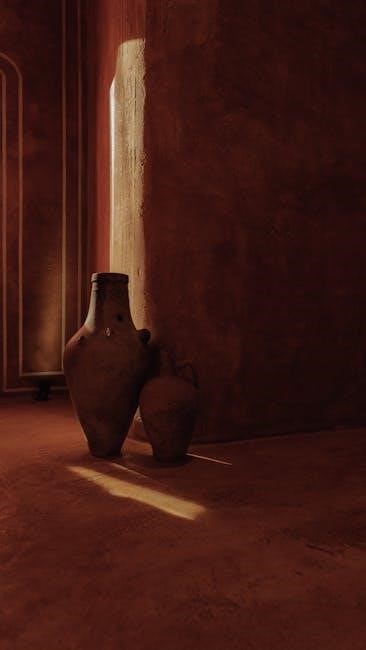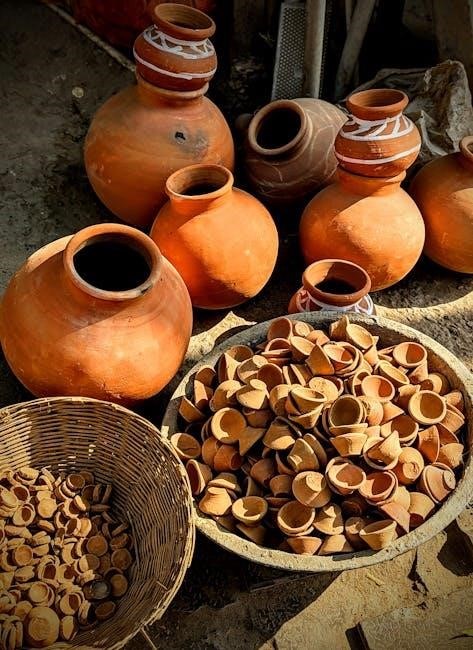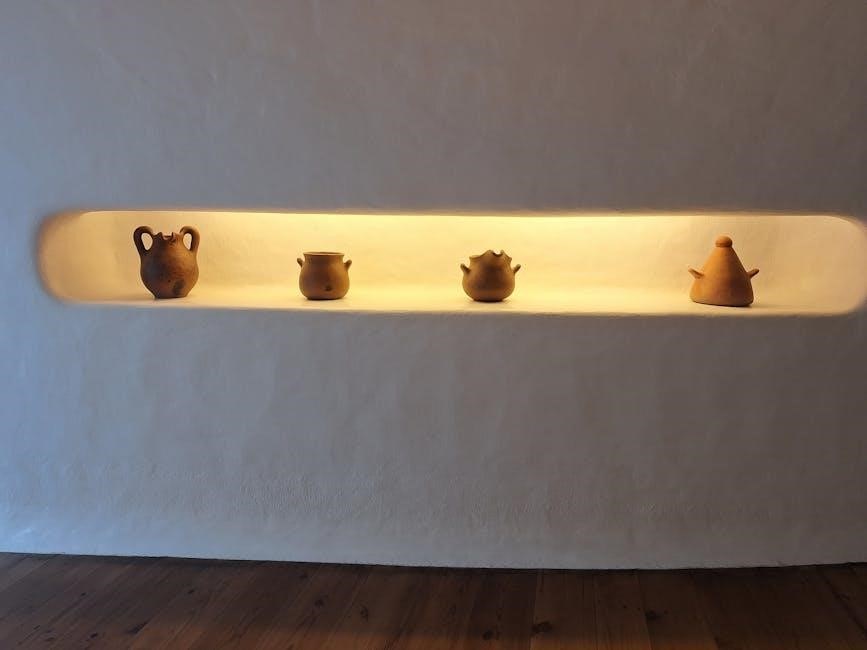
everquest pottery guide
Pottery is a unique trade skill in EverQuest, allowing players to craft clay and ceramic items essential for various activities, from Alchemy to decorative pieces. While it can be profitable, the process is time-consuming and complex, requiring mastery of both the Pottery Wheel and Kiln. With over 2000 recipes to learn, reaching skill level 350 demands dedication and strategy, making it a challenging yet rewarding craft for adventurers.
Overview of the Pottery Tradeskill
Pottery is a versatile trade skill in EverQuest that involves crafting clay and ceramic items. Players use a Pottery Wheel to shape unfired items, which are then fired in a Kiln to create finished products. With over 2000 recipes, the tradeskill is extensive, requiring significant time and resources. Pottery is considered straightforward compared to other tradeskills, as it involves fewer complex recipe interdependencies. However, it can be expensive due to material costs. Mastery of Pottery unlocks the ability to create essential items like vials for Alchemy and decorative pieces, making it a valuable skill for both utility and profit.
Importance of Pottery in the Game Economy
Pottery plays a crucial role in EverQuest’s economy, as crafted items are in high demand. Players need ceramic containers for Alchemy, Poison Making, and other tradeskills, creating a steady market. Additionally, decorative pieces and specialty items can be sold for profit. Pottery crafters can corner niche markets by focusing on rare or high-demand recipes. While the initial investment is significant, mastering Pottery can yield substantial platinum, making it a valuable skill for both crafting enthusiasts and profit-driven players. Its utility and profitability ensure its relevance in the game’s vibrant economy.
Getting Started with Pottery
Begin your Pottery journey by visiting a Pottery Merchant to purchase essential tools and learn basic recipes. Start with simple items like water flasks, gradually mastering the craft.
Basic Tools and Containers Needed
To begin Pottery, you’ll need a Pottery Wheel and a Kiln, essential for crafting and firing items. Key containers include water flasks and clay, which are used in early recipes. These tools can be purchased from Pottery Merchants in major cities like Freeport or Qeynos. Additionally, having a reliable supplier for materials like ceramic clay and relic fragments is crucial. Start with basic items like unfired pots and gradually progress to more complex creations, ensuring you have ample storage space for your crafted goods.
Starting Your Journey: Quests and Initial Setup
Begin your Pottery journey by completing the Crescent Reach and Abysmal Sea quest lines, which provide essential foundational skills. Visit Event Coordinator Baublie Diggs in West Freeport to acquire the Beginner Pottery quest, granting early access to basic recipes. Ensure you have a buyer set up for materials like relic fragments, as they are crucial for progression. Starting with simple items like unfired pots will help you familiarize yourself with the Pottery Wheel and Kiln. These initial steps are vital for building a strong foundation in the trade skill, allowing you to progress efficiently and unlock more complex recipes as you advance.

Materials and Recipes
Pottery relies on clay and water as primary materials, with recipes ranging from simple vials to complex ceramic items like Spiritstone of Everfrost and Planar Pearl Encrusted Stein.
Understanding Clay and Ceramic Recipes
Pottery in EverQuest involves crafting items using clay and water, with recipes requiring two combines: one on the Pottery Wheel and a second in the Kiln. These recipes create unfired items, which are then fired into final products like vials, steins, and decorative pieces. Ceramic recipes often yield higher-quality items, such as Spiritstone of Everfrost or Planar Pearl Encrusted Stein, which are highly sought after. The process is straightforward but time-consuming, with over 2000 recipes to master, making it a challenging yet rewarding craft for players aiming to create essential and profitable items.
Farming Locations for Pottery Materials
Efficient farming of pottery materials is crucial for crafting success. Key locations include Everfrost, Abysmal Sea, and Crescent Reach, where clay and rare resources can be found. Focus on areas with abundant clay deposits and minimal competition. Use teleportation spells or fast travel to optimize material gathering. Farming in bulk ensures a steady supply for crafting. Avoid high-traffic zones to minimize interruptions. With strategic planning, you can stockpile materials efficiently, reducing downtime and accelerating your pottery progression.

Skill Progression and Leveling
Pottery requires patience, with over 2000 recipes to learn. Avoid using AAs until skill 300, as high skill levels block trivial combines needed for trophy evolution.
Mastering the Pottery Wheel and Kiln
The Pottery Wheel and Kiln are central to crafting. Start with simple recipes, focusing on technique and resource management. Practice regularly to refine your skills, ensuring high-quality results. Combine materials in the Pottery Wheel first, then fire them in the Kiln for completion. Pay attention to trivial levels and plan your combines to avoid wasting materials. As you progress, experiment with complex recipes to improve efficiency and mastery over these essential tools.
Optimizing Your Skill Ups to 350
Reaching 350 in Pottery requires patience and strategy. With over 2000 recipes, focus on high-demand items like Spiritstone of Everfrost and Planar Pearl Encrusted Stein for efficient skill gains. Avoid spending AAs on skill boosts above 300 until your trophy is fully evolved, as some combines become trivial just above 300. Break the process into manageable parts, prioritizing recipes that offer consistent progression. Use guides to minimize the number of recipes needed and optimize your crafting sessions for maximum efficiency.
Profitable Pottery Crafting
Crafting high-demand items like vials and decorative ceramics can yield significant profit. Setting up a Pottery Bazaar allows for efficient sales and maximizing earnings.
Creating High-Demand Items
Crafting high-demand items like vials for Alchemy, Poison Making, and decorative ceramics can significantly boost your profits. Focus on creating items that are essential for other tradeskills or quests, as these tend to sell quickly. Pottery items such as Spiritstones, Planar Pearl Encrusted Steins, and Ceramic Clay are consistently sought after by players. By prioritizing these recipes, you can meet the game’s economy demands and attract consistent buyers. Keep an eye on the Bazaar for current trends and restock popular items frequently to maximize your earnings.
Setting Up a Pottery Bazaar
Setting up a Pottery Bazaar allows you to sell your crafted items efficiently; Use a buyer or merchant NPC in high-traffic zones like the Bazaar in PoK. Stock your shop with high-demand items like vials, Spiritstones, and decorative ceramics. Regularly restock based on demand trends to ensure consistent sales. Competitive pricing is key to attracting buyers, so monitor market rates and adjust accordingly. A well-organized Bazaar can become a steady source of platinum, helping you fund further crafting or other adventures in EverQuest.

Advanced Pottery Techniques
Advanced Pottery Techniques involve mastering complex recipes, optimizing crafting efficiency, and refining your use of the Pottery Wheel and Kiln for high-quality ceramic creations.
Mastery of Complex Recipes
Mastery of complex recipes in Pottery requires dedication and precision. With over 2000 recipes to learn, focusing on high-demand items like Spiritstone of Everfrost and Planar Pearl Encrusted Stein is crucial. Break down the process into manageable steps to avoid overwhelm. Utilize guides to minimize the number of recipes needed and prioritize those offering the best returns. Experiment with trivial combines to refine your skills without wasting resources. Crafting intricate ceramic pieces not only boosts your reputation but also opens doors to lucrative opportunities in the game’s economy. Practice consistently to perfect your technique and unlock advanced crafting potential.
Maximizing Efficiency in Crafting

To maximize efficiency in Pottery, focus on organizing your recipes and materials. Prioritize high-demand items like Spiritstone of Everfrost and Planar Pearl Encrusted Stein. Use bulk crafting techniques to reduce time spent on repetitive tasks. Invest in a reliable buyer for rare components to avoid delays. Keep your Pottery Wheel and Kiln in close proximity to minimize travel time. Experiment with trivial combines to refine your process without wasting resources. Maintain a well-stocked inventory of clay and ceramics to ensure consistent production. By streamlining your workflow, you can craft efficiently and elevate your Pottery skills to new heights.